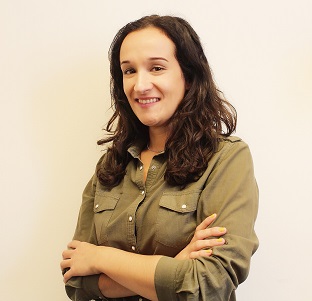Assistant Professor Maria Cuartero
The daring chemist with a knack for challenges

After postponements due to hectic schedules and post-vaccination effects, I will finally meet Maria Cuartero to learn more about her and her research. We start off comfortably chatting about language studies and social media, however, it's not just the small-talk I'm here for, but to hear more about Maria and her outlook on research.
Maria Cuartero grew up in Murcia in the south of Spain, near the mediterranean sea, and we laugh as we compare it to the wet, snow-mottled climate of Stockholm in mid February. After taking a bachelor’s degree in Chemistry as well as a PhD in Analytical Chemistry in Murcia, Maria immediately moved to the University of Geneva (Switzerland) to continue her postdoctoral stage. “I was really interested in experiencing different research philosophies but also teaching approaches [...] because I consider it super important to understand what strategies are working well in each institution in order to implement it into your own research and teaching,” Maria says. After three years in Switzerland, she was awarded the Marie Curie individual fellowship for postdocs, and moved to KTH to establish herself as an independent researcher.
Maria’s research is primarily centered around electrochemical sensors (for which she has also received the ERC Starting Grant and VR Starting Grant, form EU and Swedish funding respectively) and their possible applications, where she works with different teams in all imaginable fields –clinicians, engineers, biochemical analysts, environmentalists– in an incredible team effort.“We try to catalyze a lot of dialogue,” Maria says. “Everything is important towards the final design of the sensor. We need different fields converging for successful results” As our talks progress, I realize that Maria is not bound neither here nor there. In her scientific approach as well as career, she is a passionate networker whose ambitions do not adhere to a singular place or scientific field. “I’ve known since I was a child that I wanted to become a scientist,” Maria replies when I ask her. “And after finishing my bachelors, I knew that I wanted to continue with my PhD and my postdoctoral studies towards a career in academia, because it would offer me a balance between research and teaching.” She adds, “I love to transmit my experience –I would not say only knowledge, but experience– to students and inspire them as well. It’s important to motivate students to research, but also it’s important to have a personal calling.”
A scientific career is not always easy, she tells me.“It’s not a steady stage,” Maria says, “you are always learning, always improving. And this was what really attracted me. [But] you need to have your life in balance [...] because the scientific career is very demanding. You never stop thinking about new ideas. At the same time, this is my passion. You need passion in this job to really be motivated.” She laughs, and adds, “I hope I can have this same energy in 20 years.” When asked what additionally motivates her, she says: “I like to think that what I’m doing is useful for society. [This goes] in both directions, with my teaching and my research lines. And in my research [my team and I aspire] to solve something that is challenging. What really motivates me is to have something that in the future could help. Even if it's just one single sensor.”
Maria goes on to tell me about multiple exciting cutting-edge projects she’s looking forward to, one the more challenging than the next, in all imaginable kinds of fields; environmental sustainability, cancer treatment and mobile phone apps connected to artificial intelligence based on the data provided by the sensors. I ask her if she enjoys a challenge, and she laughs. “Yes! Otherwise it’s too boring, isn’t it? That’s how I got my ECR Starting Grant: doing something that is high risk, but high gain. In plain words, proposing something that is “crazy”, but if you materialize it, it will become a game changer.”
I think I can relate to Maria on more things than just our language struggles and our love for twitter: the noble aspiration to make changes beneficial to society.
Text: Selma Nilsson
